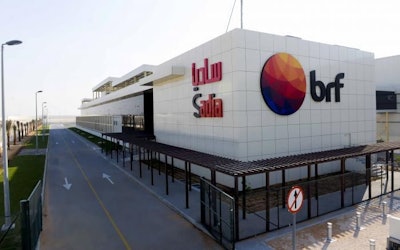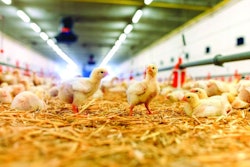
Details are emerging from BRF S.A. about a joint venture it is forming with Halal Products Development Company (HPDC) of Saudi Arabia.
The aim of the new entity is to support the development of the halal industry in the Kingdom of Saudi Arabia, according to BRF’s Chief Financial and Investor Relations Officer, Fabio Luis Mendes Mariano.
The agreement was executed through BRF’s German-registered subsidiary, BRF GmbH, and HPDC. Ownership of the new business will be shared 70% and 30%, respectively. HPDC is wholly owned by the kingdom’s sovereign wealth fund, the Public Investment Fund (PIF).
While some details of the transaction are still subject to regulatory and internal approval, it has been announced that the new business in Saudi Arabia will be a fully integrated poultry company. With a total investment of US$500 million, it will produce and sell fresh, frozen, and processed chicken products. Of the total, 25% will be paid by the two parties on the incorporation of the joint-venture, and the balance according to an investment plan still to be finalized.
Also set to be established as part of the agreement are a Halal Headquarters, a Halal Food Innovation Center, and a Center of Excellence in Saudi Arabia.
As well as boosting national chicken production, the new entity will also support greater competition in Saudi Arabia, reports Gulf Business.
By 2025, Saudi Arabia aims to achieve 80% self-sufficiency in poultry production. This target was set to reduce the nation’s reliance on imports, as well as to support its knowledge and technology resources.
At the start of this year, BRF signed a Memorandum of Understanding with PIF regarding the creation of this new joint venture.
In July, BRF inaugurated a new poultry plant in Dammam, Saudi Arabia. Acquired in early 2021, the investment cost for BRF Sadia was reported at US$18 million.
Saudi Arabia’s poultry sector attracts substantial investment
Currently at 68%, Saudi Arabia has already achieved success in raising the level of self-sufficiency in poultry meat. In 2016, the figure was just 45%.
To achieve the target of 80% — of 1.3 million metric tons — the agriculture minister announced a substantial addition to the Agricultural Development Fund in July of this year.
In May, global protein-based food company JBS announced the acquisition of two plants in the Middle East and North Africa region. One of these facilities is in Saudi Arabia, where the group was also developing its own local distribution network.
Just two months later, it was reported that U.S.-based Tyson was investing in the Kingdom’s halal-specialist Tanmiah Food Company.
Between 2016 and 2020, chicken meat production by Saudi Arabia increased by 50%, according to the statistics arm of the United Nations’ Food and Agriculture Organization, FAOstat. In the latter year — most recent for which data are published — national output of fresh and chilled product stood at 900,000 metric tons.
In the past few days, Gulf Business reported that PIF had launched a new company to invest in local halal food production in the Kingdom.














